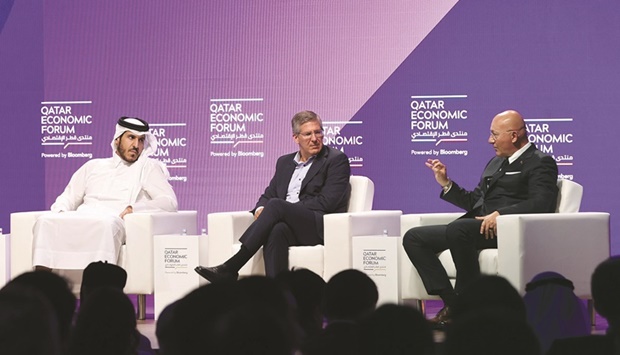Doha has attracted foreign investments in excess of $3bn so far this year in its capital market, higher than the $1.8bn total investments for the whole of 2021, indicating the attractiveness and confidence of global investors, according to HE Minister of Commerce and Industry Sheikh Mohamed bin Hamad bin Qassim al-Thani.
Addressing the second Qatar Economic Forum, powered by Bloomberg, he said the ongoing conflicts changed Qatar's perspective of the world and the destination of its foreign investments.
Investment in the energy and other fields in the Middle East are likely to increase, he expressed the hope.
He said Qatar has adopted the free trade policy and made many structural reforms to enhance the concept of trade openness.
International trade currently constitutes about 55% of the gross domestic product or GDP of world countries compared to about 5% 70 years ago, he said, highlighting the growing importance of the international trade as an engine of growth.
In this context, he said that Qatar depends a lot on global trade, as around 90% of its GDP comes from international trade, therefore requiring it make fundamental reforms and attract more trade.
"The world is witnessing a reshaping of the economy, especially in investments," the minister said.
Foreign direct investment (FDI) into Qatar rebounded in 2021, attracting 82 projects, which represented a stupendous 273% growth compared to inbound project numbers in 2019, according to the recent fDi Report 2022.
The Gulf country accounted for more than 6% of the total inbound FDI projects in the Middle East and Africa region, said the report, prepared by fDi Intelligence, a services from the Financial Times.
The report said one of the most capital intensive investments in 2021 was the US-based Eat Just’s plans for a new $200m commercial facility in Qatar. It will produce cell-based meat, with plans to eventually add capacity to also produce the company’s egg alternative product called Just Egg.
Dogus Group chairman and chief executive Ferit F ?ahenk said the global economy will face a rescission and there may be an economic decline.
He stressed on the importance of inclusiveness and the presence of co-operation and a collective action plan to solve the economic problems and challenges facing the world and the necessity of flexibility in the global system, the International Monetary Fund, and the United Nations.
Global Chairman of PwC Bob Moritz said today the world is going through a supply chain reconfiguration, in comparison to what things used to be five years ago in terms of how to reduce dependence on the concentration of different risks and the multiplicity of options available.
The supply chain is not just about products, but about services, human capital, and reshaping those concepts. He pointed out that there is a link between energy security and food security as this link created a challenge for the world countries to face, according to him.
Addressing the second Qatar Economic Forum, powered by Bloomberg, he said the ongoing conflicts changed Qatar's perspective of the world and the destination of its foreign investments.
Investment in the energy and other fields in the Middle East are likely to increase, he expressed the hope.
He said Qatar has adopted the free trade policy and made many structural reforms to enhance the concept of trade openness.
International trade currently constitutes about 55% of the gross domestic product or GDP of world countries compared to about 5% 70 years ago, he said, highlighting the growing importance of the international trade as an engine of growth.
In this context, he said that Qatar depends a lot on global trade, as around 90% of its GDP comes from international trade, therefore requiring it make fundamental reforms and attract more trade.
"The world is witnessing a reshaping of the economy, especially in investments," the minister said.
Foreign direct investment (FDI) into Qatar rebounded in 2021, attracting 82 projects, which represented a stupendous 273% growth compared to inbound project numbers in 2019, according to the recent fDi Report 2022.
The Gulf country accounted for more than 6% of the total inbound FDI projects in the Middle East and Africa region, said the report, prepared by fDi Intelligence, a services from the Financial Times.
The report said one of the most capital intensive investments in 2021 was the US-based Eat Just’s plans for a new $200m commercial facility in Qatar. It will produce cell-based meat, with plans to eventually add capacity to also produce the company’s egg alternative product called Just Egg.
Dogus Group chairman and chief executive Ferit F ?ahenk said the global economy will face a rescission and there may be an economic decline.
He stressed on the importance of inclusiveness and the presence of co-operation and a collective action plan to solve the economic problems and challenges facing the world and the necessity of flexibility in the global system, the International Monetary Fund, and the United Nations.
Global Chairman of PwC Bob Moritz said today the world is going through a supply chain reconfiguration, in comparison to what things used to be five years ago in terms of how to reduce dependence on the concentration of different risks and the multiplicity of options available.
The supply chain is not just about products, but about services, human capital, and reshaping those concepts. He pointed out that there is a link between energy security and food security as this link created a challenge for the world countries to face, according to him.


